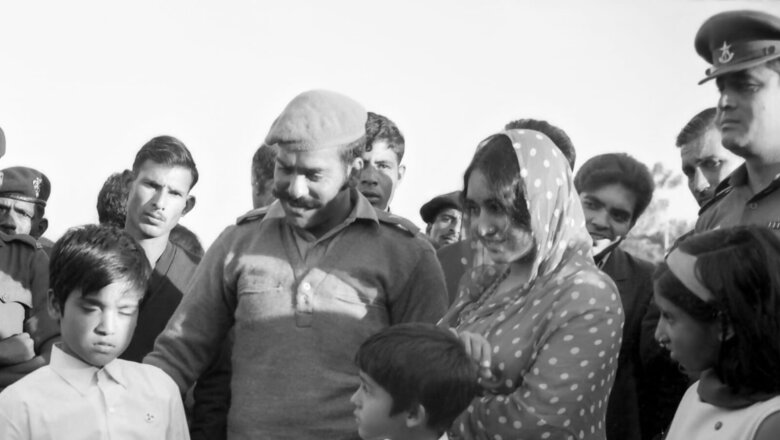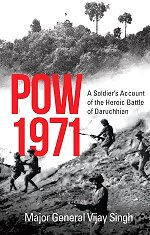
views
Towards the third week of November the media was flooded with news about hectic political activity in both India and Pakistan. At Lyallpur there were rumours that a very important person would be visiting soon and he would address all Indian POWs. The camp was spruced up, confirming news of the impending VIP visit.
On the twenty-third of November it was announced that the President of Pakistan Zulfikar Ali Bhutto would be visiting the camp the next day. All POWs were required to be dressed appropriately, and as the senior most Indian officer, Hamir was to be prepared to have tea with the President. Major Sher Jaman informed Hamir that a message had been received that the Pakistani Chief of Staff General Tikka Khan may also meet him after Mr Bhutto had left.
The next morning a large contingent of journalists and security personnel descended on Lyallpur Jail. At ten o’clock a helicopter could be heard landing near the jail premises. Shortly thereafter sirens announced the arrival of Mr Bhutto.
The jeep carrying Mr Bhutto stopped near the temporary dais that had been set up for his address. The President walked onto the dais and addressed the POWs while the large media contingent took photographs and made notes.
The gist of his talk was that despite the Indian government’s intransigence Pakistan had decided to release all Indian POWs unilaterally. The news gladdened the hearts of the POWs but they were still a bit sceptical. Only time would tell whether this would actually happen.
The President left immediately, skipping the tea that had been organized. General Tikka Khan followed suit without interacting with any of the POWs.
Later that evening Sher Jaman met Hamir over tea. The topic turned to the visit of the President and General Tikka Khan. Before the President arrived Sher Jaman had spent some time in General Tikka Khan’s company. He had been surprised by the interest Tikka Khan had shown in Hamir’s well-being. The general had even insisted that Sher Jaman point Hamir out while he sat in a corner among other POWs, waiting for Bhutto.
Much later in life Hamir realized the connection between General Tikka Khan and his father Maj Gen Kalyan Singh. Tikka Khan and Kalyan Singh had fought together during the Second World War as part of the 2nd Indian Field Regiment. General Tikka Khan had learnt of Hamir’s presence in the POW camp and wanted to see the son of his erstwhile colleague, friend and course mate.
One mystery though remained. Was Tikka Khan then the ‘bade officer’ that the SM at CMH, Rawalpindi had spoken of? The one who supposedly knew Hamir. Or was it Brigadier Adeeb who he met in Nigeria? Or someone else altogether?
No matter who it was Hamir came to believe that his survival through prison and his repatriation was destiny. He could very easily have been among the more than fifty POWs who never returned to their motherland.
Early on the twenty-fourth of November it was announced that all Indian POWs would be released on 1 December 1972—what Vijay, Hamir’s younger son, had in his innocence mentioned in his letter turned out to be true!
~
The next few days were spent on closing of accounts and other documentation.
Each POW was entitled to a monthly allowance depending on their rank. The sepoys and lance naiks were granted Rs 9/- per month while the majors received Rs 60/- per month.
Though less than what Pakistani POWs received in India the allowance primarily covered purchase of essential toiletries from the canteen. Since money was not physically handed over during their stay the balance due after their credit was cleared was required to be calculated. This would now be handed over to them prior to their departure.
On the thirtieth of November all POWs were asked to pack their belongings. It was announced that departure from the camp was scheduled for the evening.
There was an air of excitement in the camp as the POWs gathered their meagre belongings and packed them in whatever bag or packet they could muster. Some, like Hamir, had fabricated suitcases with cardboard and towel material, as part of their creative projects.
In the evening a large number of buses arrived at the camp. The entire lot of over 600 Indians was asked to board the buses which would transport them to Lyallpur Railway Station.
When POWs had arrived at Lyallpur Central Jail they had been blindfolded and handcuffed. In contrast while leaving Lyallpur they boarded the buses without any encumbrances.
Tears of joy flowed easily from the eyes of the POWs as the gates of Lyallpur Jail shut behind them. The fact that they were now on the other side of the prison gates finally dawned upon them.
At Lyallpur Railway Station a special train stood waiting for the POWs. They were escorted into their compartments. By the time the train departed from Lyallpur it was past eight. It had been a long day. The excitement and activity had minutes.
Hamir woke up the next morning at five-thirty. It took him some time to remember that he was on his way home. The train was static. He looked out of his window trying to read the name of the station. The signpost some distance away read Bhagwanpur. Hamir was a bit confused as Bhagwanpura was the name of his own village. He wondered whether he had overslept. Have I already reached my village?
The guard standing outside cleared the confusion. He informed him that the train had halted at Bhagwanpur, on the outskirts of Lahore.
The train remained halted at Bhagwanpur, which apparently was its destination. Finally at about nine a convoy of buses arrived and the POWs were soon on the final leg of their journey.
They arrived at the Wagah border crossing point after forty-five minutes. On arrival the POWs were ordered to alight and line up in the order that their names were read out. Moving across the border would be carried out on foot and as per their military ranks. Major Hamir, being the senior most, would lead the POWs into India.
The sound of a whistle signalled the commencement of the ceremony. Hamir picked up his small white handmade suitcase and commenced walking the final 200 yards into India. He walked proudly leading the column of POWs back to their motherland.
As he stepped over the line marked on the road signifying the international border he turned back to look at Pakistan for a final time.
Many thoughts raced through his mind, including his father’s congratulatory letter on being commissioned as an officer in the Indian Army. His father had written, ‘I can bear your loss, but not disgrace!’
His father, a veteran of many wars, including the then recent 1962 Sino-Indian War, had experienced loss, witnessed heroism and on a few occasions even seen soldiers bring disgrace. Hamir was certain his father would be anxious to know how his son performed in battle.
One thing was certain. Hamir was alive and his father wouldn’t have to bear his loss. But a more serious question was yet to be answered—had he kept the family honour intact?
ALSO READ | March 26 to December 16, 1971: How Parliament Kept Pressure on Indira Govt to Liberate East Bengal
All the company commanders and senior JCOs who took part in the attack on Daruchhian had either been killed or captured. Therefore the narrative of the disastrous battle had been based on the sole testimony of Lt Col Inderjit. ‘As it was, he was almost left out of it, content to command by telephone or radio’, ‘well behind’ from Point 471 on the Indian side, where he was located with his reserves. It was impossible for Inderjit to experience what was actually happening on the ground. He had a lot of explaining to do as his ‘over ambitiousness’ had resulted in eight officers, seven JCOs and 149 men of other ranks killed, injured or missing in a period of just twelve hours. His narrative was understandably defensive and one-sided. Brigadier Hari Singh had submitted his report of the battle to the higher authorities which presented a contradictory point of view.
It was only the men who had actually fought on the slopes of Daruchhian that fateful morning who would provide the missing part of the puzzle. These men had either died or were captured during the battle. Therefore the Indian Army had been eagerly awaiting the return of the POWs; their debriefing would unravel the details of the Battle of Daruchhian. The debriefing reports, Hamir hoped, would settle once and for all whether he had brought disgrace to his father.
He had fought hard and bravely at Daruchhian, this he was certain of. But it was the testimony of the other returning POWs that would reveal the truth.
Engrossed as he was in these thoughts the poignancy of returning to his motherland was lost on Hamir.

Read all the Latest Opinions here




















Comments
0 comment